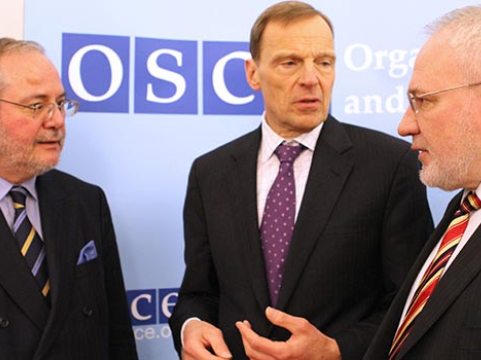Karabakh mediators concerned over ‘lack of tangible progress’

Azerbaijani official: Peace talks suspended
By Arslan Abbasov & Sara Rajabova
The co-chairs of the OSCE Minsk Group brokering settlement to the Armenia-Azerbaijan conflict over Nagorno-Karabakh have expressed concern over the lack of tangible progress in peace negotiations, the organization's report said last Thursday.
The co-chairs -- Jacques Faure of France, Robert Bradtke of the United States and Igor Popov of Russia -- and the personal representative of the OSCE Chairperson-in-Office, Andrzej Kasprzyk, met last Wednesday with Armenian Foreign Minister Edward Nalbandyan, and on the following day with Azerbaijani Foreign Minister Elmar Mammadyarov in New York.
In their separate meetings with the two ministers, the co-chairs discussed recent developments in the region and continued to urge the parties "to return to the substance" of the Nagorno-Karabakh negotiations.
The ministers reiterated their support for a peaceful solution, and their readiness to continue the negotiations.
Meanwhile, Azerbaijani Deputy Foreign Minister Araz Azimov told journalists that negotiations between Azerbaijan and Armenia on the Nagorno-Karabakh conflict are suspended.
Azimov added that meetings of the Minsk Group co-chairs are periodically held on different levels. However, the negotiation process is not underway to address concrete issues in a certain time and on a daily basis.
He said the periodic visits of the co-chairs cannot remain fruitless.
"During every visit, having arrived in Azerbaijan, they learn about our position. Then heading to Armenia, the co-chairs hear something there too. Then they say that discussions will continue in international organizations, the UN and the OSCE, and because no progress is achieved on this issue, to fill the void they talk about confidence-building measures.
"Azerbaijan has put forward a number of initiatives, but Armenia refused to accept them," Azimov said.
Moreover, he stressed, some statements of the co-chairs do not comply with the situation in general.
"When Azerbaijan proposed dialogue with the Azerbaijanis of Nagorno-Karabakh and their neighbors Armenians, the Armenian side rejected it. Therefore, I see speculations on the part of the Armenian side and the co-chairs," Azimov said.
He said "proposals corresponding to the realities" should be put forward and realized.
Overall, he added, sporadic visits by the mediators to the region "cannot be considered the negotiation process".
Azerbaijani President Ilham Aliyev also mentioned the Karabakh conflict in a meeting with participants of the Azerbaijan-European international conference "Building Bridges" held last Thursday in Baku.
President Aliyev noted that the neither peace nor war situation has to change. Aliyev said that Yerevan does not honor resolutions of the UN Security Council demanding an immediate and unconditional withdrawal of Armenian armed forces from the occupied territories of Azerbaijan.
"The situation is indeed very dangerous and it can't last forever. However, the Armenians don't want to change the situation, they try to strengthen the status-quo."
The president noted that although the mediating OSCE Minsk Group has worked for twenty years on the conflict settlement, there is still no result. The Armenians don't take into consideration the calls of the co-chairing countries -- France, Russia and the United States -- on changing the status-quo.
Aliyev stressed that this is a serious problem relating to regional peace and stability, because the conflict isn't "frozen" and peace is "very fragile".
The Karabakh conflict was also discussed in a meeting between Azerbaijani Foreign Minister Mammadyarov and US Assistant Secretary of State for European and Eurasian Affairs Philip Gordon in New York last Thursday.
They exchanged views about the ongoing peace talks between Armenia and Azerbaijan.
Tensions between the two countries, which have been at odds since fighting a bitter war in the early 1990s over the Azerbaijani region of Nagorno-Karabakh, escalated after the extradition and subsequent pardoning of Azerbaijani officer Ramil Safarov -- who was transferred to his home country after being jailed for killing an Armenian officer while in a state of emotional distress in Hungary in 2004.
Ramil Safarov had been serving a life sentence pronounced by a Budapest court without the right to a parole for 30 years. On August 31, Hungary extradited Safarov to Azerbaijan, where he was pardoned by President Ilham Aliyev.
The Karabakh conflict emerged in 1988 when Armenia made territorial claims against Azerbaijan. The ensuing war ended with the signing of a precarious cease-fire in 1994. Armenian armed forces have since occupied over 20 percent of Azerbaijan's internationally recognized territory, including Nagorno Karabakh, defying UN resolutions. Peace talks have been largely fruitless so far.
Armenia has not yet implemented the U.N. Security Council's four resolutions on a pullout from Nagorno-Karabakh and the surrounding regions.
Here we are to serve you with news right now. It does not cost much, but worth your attention.
Choose to support open, independent, quality journalism and subscribe on a monthly basis.
By subscribing to our online newspaper, you can have full digital access to all news, analysis, and much more.
You can also follow AzerNEWS on Twitter @AzerNewsAz or Facebook @AzerNewsNewspaper
Thank you!
